This post may contain affiliate links. Please read my disclosure and privacy policy.
Singapore Noodles are a take-out favorite, featuring comforting noodles tossed with curry powder and veggies. This version is my easy homemade spin, using ingredients that you probably already have on hand in your pantry. You can whip it up in just 30 minutes or less!
Oddly enough, Singapore noodles originate from Cantonese cuisine and are popular in Hong Kong, but they are not actually very common in Singapore.
This curried noodle stir-fry is traditionally made with rice noodles called vermicelli, bell peppers, scrambled eggs, and shrimp, prawns, or pork, but this version is my healthier take on it, with a hefty portion of veggies in each serving.
If you’re familiar with my Peanut Noodles or Vegan Pad Thai recipes, you know how much shredded cabbage can become noodle-like when it’s sauteed. Pair it with pasta, and it will feel like you’re eating a big plate of comforting noodles, with a sneaky serving of veggies in each bite.
Helpful Tips
What do Singapore Noodles taste like? Singapore noodles remind me of Lo Mein or Pad Thai, only there’s curry powder stirred into the sauce, so it’s slightly spicy, salty, and tangy, with a hint of sweetness.
It’s not as saucy as a Thai curry sauce, but the flavor is amazing, even without a creamy sauce.
Which noodles work best? This dish is traditionally made with thin rice noodles, but I usually keep gluten-free chickpea noodles on hand, so any thin noodle you have on hand will work! Linguine noodles are pictured here, but you can also use spaghetti, Pad Thai noodles, or angel hair pasta.
Ingredients You’ll Need
What are Singapore Noodles made of?
- Noodles
- Red bell peppers
- Red onion
- Curry stir-fry sauce
- Shredded cabbage
You can add extra protein to this dish, like crispy baked tofu, or top it with any animal protein you like. It’s commonly made with scrambled eggs, prawns, or beef. It’s also filling on its own when you use a legume-based pasta as the base!
Note: I purchase jars of curry powder from the grocery store, and my favorite brands are Simply Organic, Trader Joe’s, or Whole Foods 365 brand. The curry powder you use may be more mild or spicy than the type I use here, so feel free to add more if needed, or start with less if you think you’ll be sensitive to the spice. Some brands are definitely more spicy than others!
How to Make Singapore Noodles
1. Prepare the pasta. Bring a large pot of salted water to a boil, and prepare the noodles according to the package directions.
Note: If you’re using traditional vermicelli rice noodles, you’ll soak them in a pot of boiled water according to the directions on the package, rather than actively boiling them like other noodles.
2. Sauté the veggies. While the pasta is cooking, heat a tablespoon of olive oil in a large skillet over medium heat. Add the red onion, bell pepper, and cabbage to the skillet, and stir well, letting the veggies cook down for about 10 minutes.
Add the garlic and ginger, and stir for 1 more minute.
3. Make the stir fry sauce. In a bowl, combine the sauce ingredients and stir well. This isn’t the type of sauce you’ll want to taste-test directly from the bowl; the flavor will mellow out significantly when it’s tossed with the noodles and veggies.
Add the noodles and sauce to the large skillet of veggies and toss well, until everything looks evenly coated in the sauce and is piping hot. I like to add in a 1/2 teaspoon of salt and a 1/2 teaspoon of ground black pepper to boost the flavor, too, but you can add that to taste.
4. Enjoy! Serve the noodles warm right away for the best flavor and texture. These are also delicious cold from the fridge the next day, if you have any leftovers for an easy lunch.
Storage Tips
Leftover Singapore Noodles can be stored in the fridge for up to 5 days in an airtight container in the fridge. I think they taste just as delicious cold from the fridge, so they make an easy lunch the next day, too!
To reheat, simply stir them in a skillet over medium heat for 3 to 5 minutes.

Ingredients
- 8 ounces thin noodles
- 1 tablespoon extra-virgin olive oil
- 1/2 red onion , thinly sliced
- 1 red bell pepper , thinly sliced
- 1 pound shredded cabbage
- 1 inch fresh ginger , minced
- 1 garlic clove , minced
- 2 green onions , chopped (for garnish)
- 1/2 teaspoon fine sea salt & black pepper
Curry Stir-Fry Sauce
- 1 tablespoon toasted sesame oil
- 3 tablespoons tamari (gluten-free soy sauce)
- 2 teaspoons curry powder
- 1 tablespoon rice vinegar
- 1 tablespoon maple syrup
Instructions
- Bring a pot of salted water to a boil, and cook the noodles according to the directions on the package. When they are done, drain and set aside.
- While the noodles are cooking, heat the olive oil in a separate large skillet over medium heat and add in the red onion, bell pepper, and shredded cabbage. Stir until the veggies have softened, about 8 to 10 minutes. Add in the ginger and garlic, and stir for 1 more minute.
- To prepare the sauce, stir together the sesame oil, tamari, curry powder, vinegar, and maple syrup. Pour the sauce over the sauteed veggies and add in the cooked noodles.
- Season the noodles and veggies with a 1/2 teaspoon of salt and black pepper, or to taste, and toss well to make sure everything is well-coated in the sauce and piping hot. Serve warm right away, with chopped green onions on top, if desired. Leftovers can be stored in an airtight container in the fridge for up to 5 days. (They are delicious cold, too!)
Video
Notes
Nutrition
If you try these Singapore Noodles, please leave a comment below letting me know how you like them!
–
Reader Feedback: What’s your favorite noodle dish? Let me know if you have any favorite dishes that need a healthy & easy makeover.
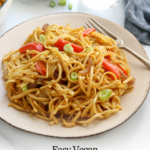
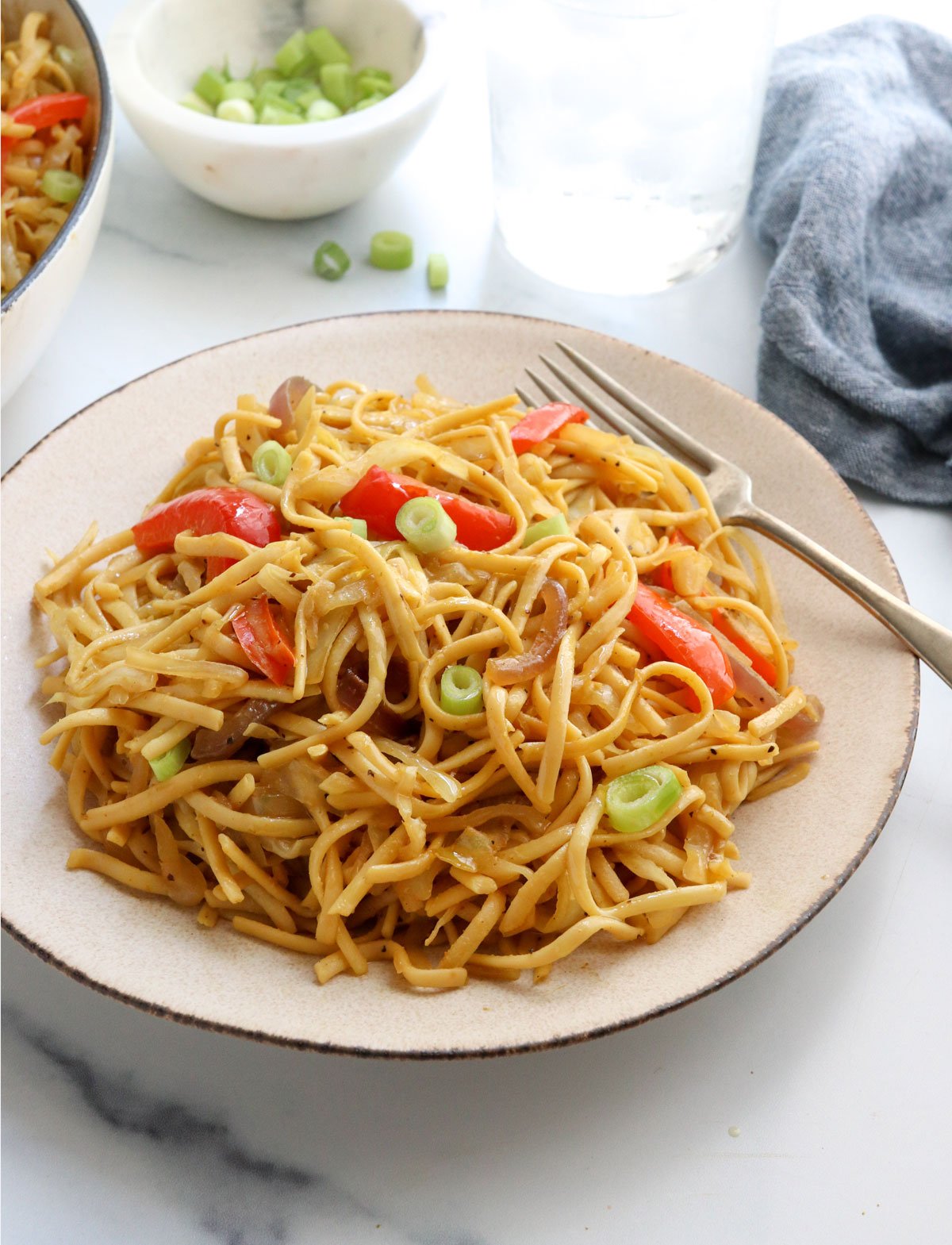
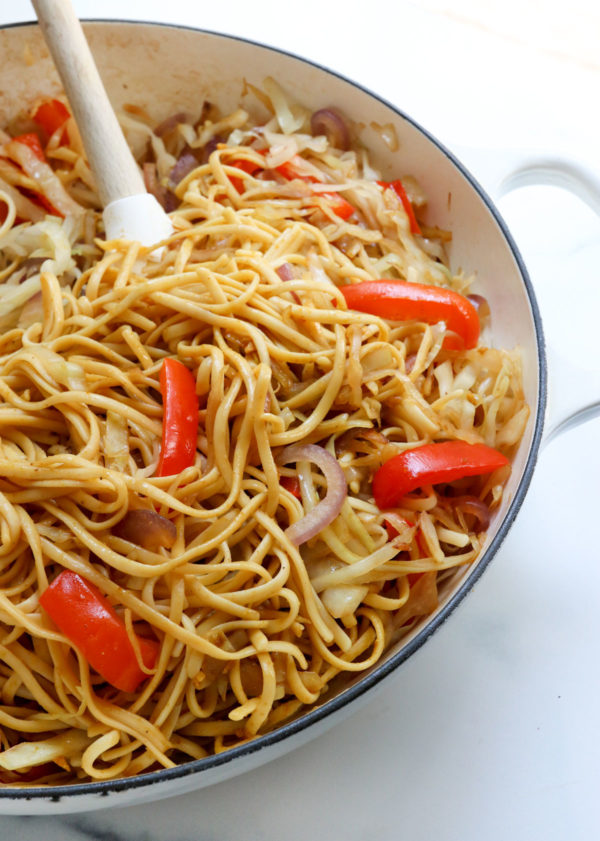

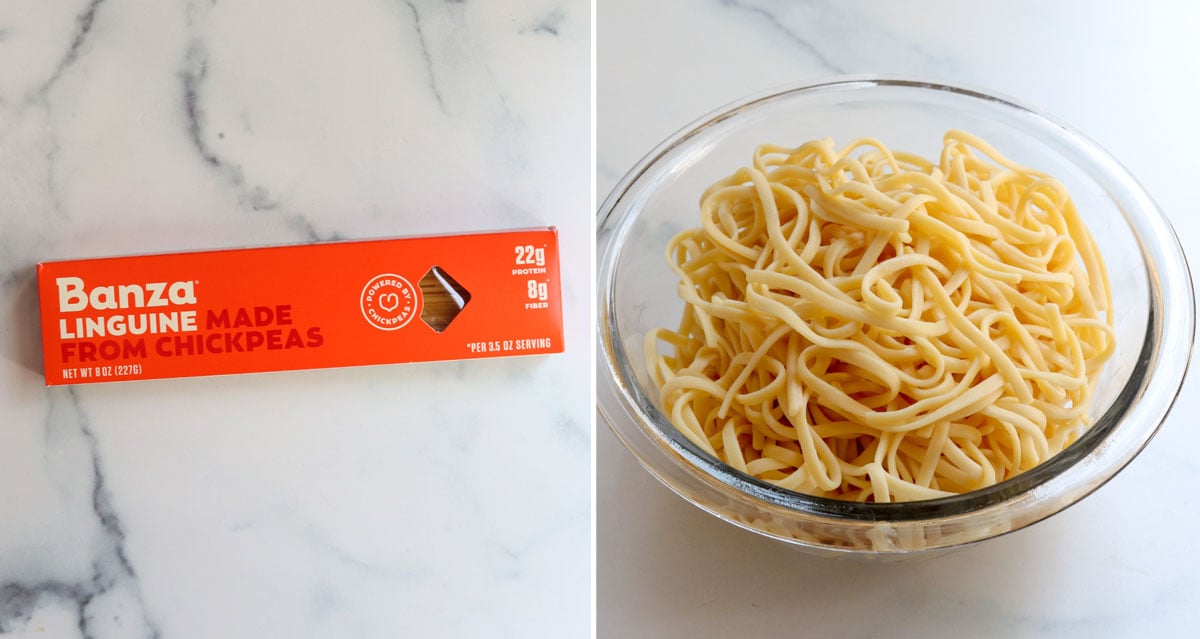
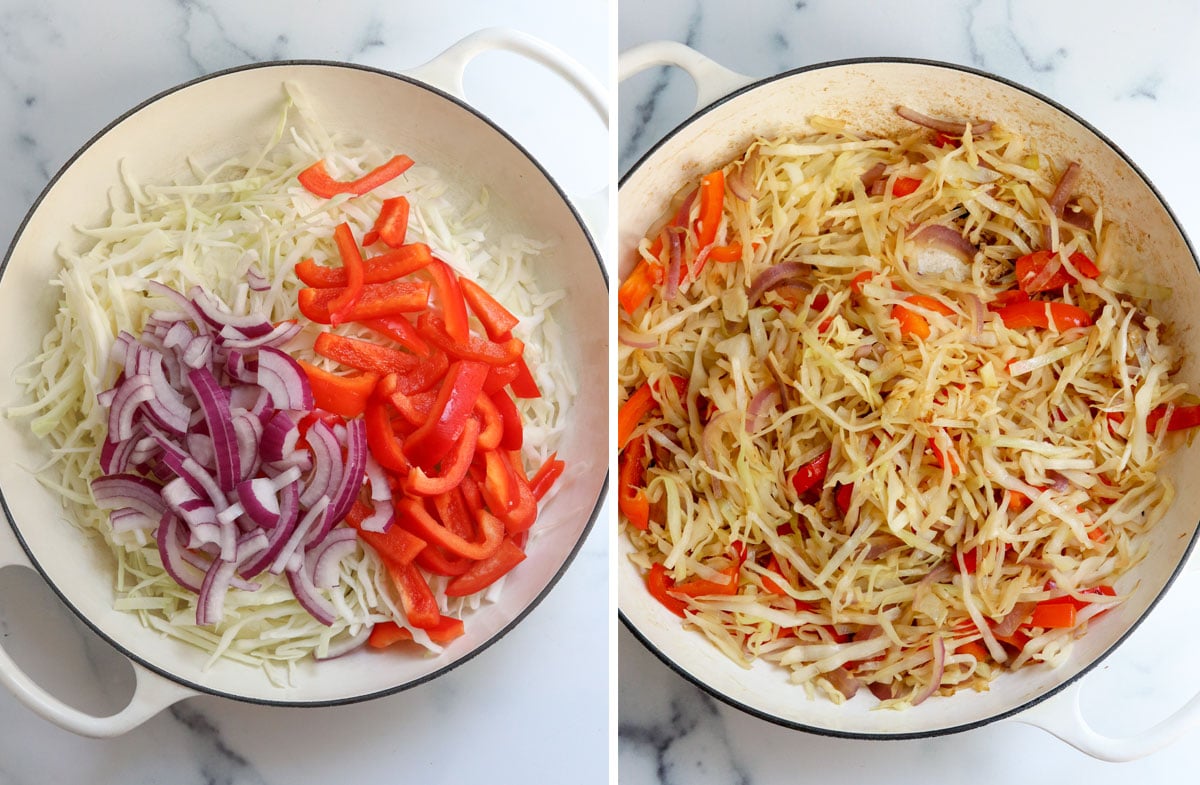

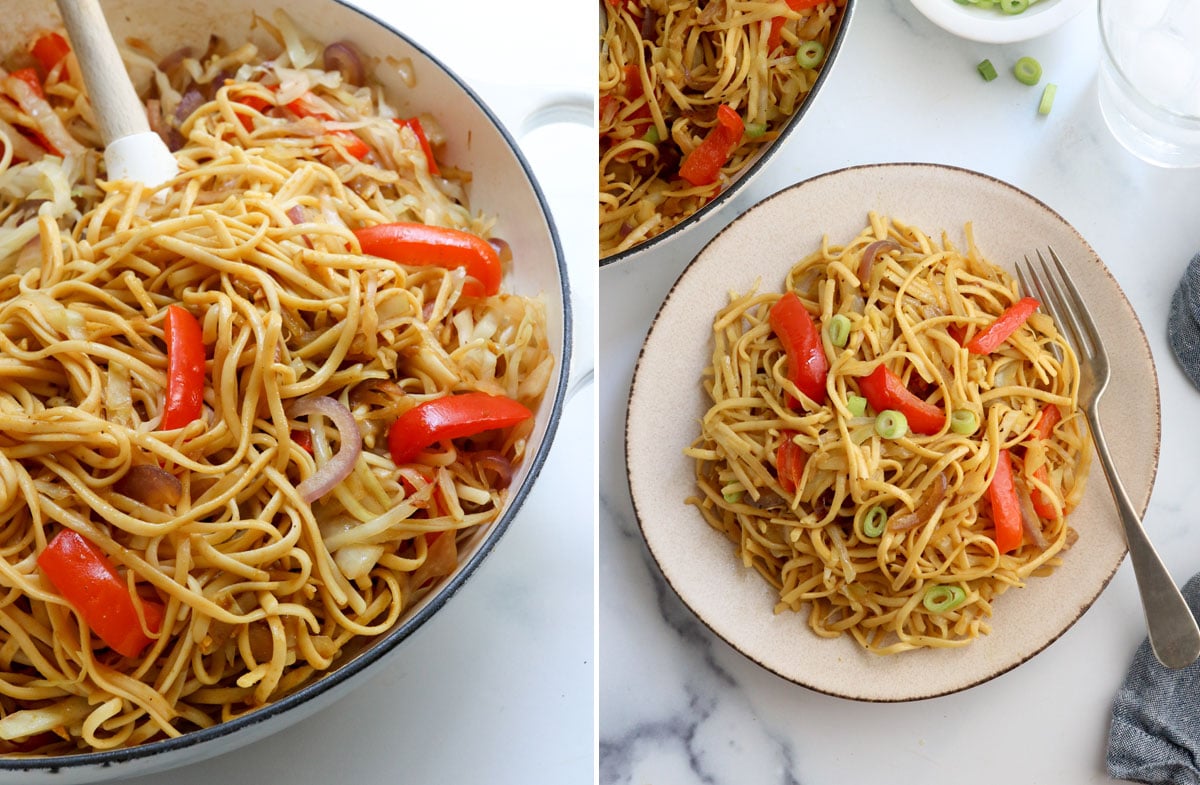






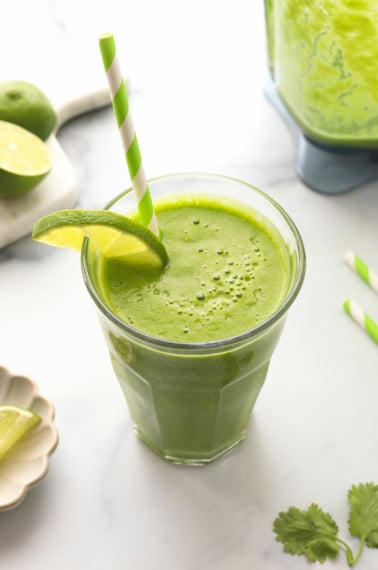


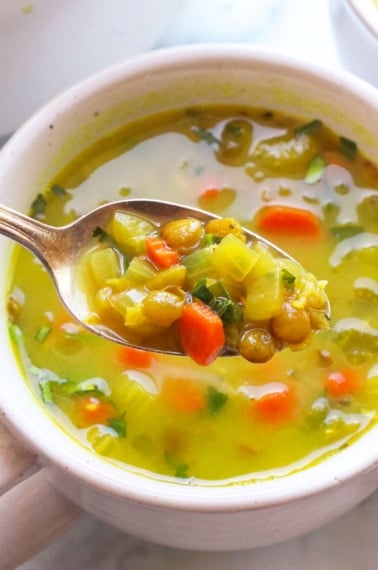






So much flavor!
Oh my yum!! I am in the middle of eating this right now. It is sooooo good. It’s also so easy to make! Followed it to a T!
Made these last night and me and my husband loved them! The dish came together quickly, even with me adding some extra time to fry up some tofu to go with it (in toasted sesame oil and with a little corn starch for a crust). I used brown rice noodles. I’m not well-versed in using curry powder, so I have you rely on other peoples trial and error. I followed the recipe exactly and it was well-balanced and flavorful. I’ll be adding to my regular rotation!
Looks delicious, can i substitute (low-sodium) soy sauce for the tamari (which i don’t have)?
Sure! You can always season with extra salt, if you need to later.
We tried these tonight as I needed to use up some cabbage, and anything with noodles can’t go wrong. I made the recipe for 3 servings, but it sure was a lot more than 3 could eat!! Hubby says, “Well, THAT one is a keeper, for sure!!”
Great recipe! I made this twice already with slight modifications. The first time, I used fettuccine style shirataki noodles to get the rice noodle texture. The second time I did not add noodles at all. The recipe turned out great both times. I add cubed tofu to make it a little more filling. I am definitely going to keep this in my regular rotation of recipes. Thank you!
Delicious! Love love love your easy to follow recipes. Perfect every time!
So good! I adjusted the servings to 6 for my family of 4 and there were not leftovers 😂
Very easy recipe. The sauce is quite authentic. I know because I lived in Singapore. I used rice noodles. I will be making this often.
Trying this tonight – looks delicious
My first time cooking with these types of sauces and oils but i am so glad i went and got all the ingredients. I’ve always wanted a healthy version of these noodles. I am so pleased because for a novice like me it turned out really delicious and enough for leftovers to take to work now i’m back in the office – will be making this regularly along with your salmon curry. Thank you Megan for making this type of food accessible and healthy! I am now wondering whether it would also work with brown rice for Singapore style rice dish?